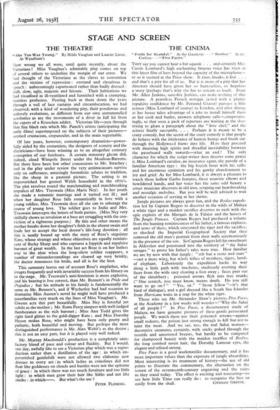STAGE AND SCREEN
THE THEATRE
How wrong we all were, until quite recently, about the Victorians ! Miss Vaughan's admirable play comes on top of several others to underline the margin of our error. We had thought of the Victorians as the slaves to convention and the victims of repression : orotund and circuitous in ,,peech : unbecomingly caparisoned rather than badly dressed : dull, slow, ugly, majestic and hirsute. Their habitations we had visualised as ill-ventilated and furnished with a cramping, tasteless profusion. Peering back at them down the years through a veil of lace curtains and circumlocution, we had observed, with a kind of wondering pity, their ponderous and unlovely evolutions, as different from our own untrammelled acrobatics as are the movements of a diver in full kit from the capers of a Kruschen addict. Victorian life—seen through that fine black rain which Mr. Punch's artists (anticipating the early films) superimposed on the subjects of their pictures— seemed crustacean, crepuscular, and in the main regrettable.
Of late years, however, contemporary dramatists—power- fully aided by the costumiers, the designers of scenery and the electricians—have been winning us to an altogether contrary conception of our forebears. A certain minatory gloom did, indeed, cloud Wimpole Street under the Moulton-Barrens. But there have been few other concessions to Mr. Strachey ; and in the play under review the very antimacassars survive only on sufferance, amusingly formalistic salutes to tradition, like the sheep in a pastoral picture. The setting is an impoverished but genteel Welsh household in the 5870's. The plot revolves round the matchmaking and matchbreaking impulses of Mrs. Treowain (Miss Marie Ney). In her youth she made a romantic marriage and it turned out ill ; and when her daughter Rose falls romantically in love with a young soldier, Mrs. Treowain does all she can to sabotage the course Of young love. The soldier goes to India and Mrs. Treowain intercepts the letters of both parties. (Miss Ney very skilfully shows us revulsion at a base act struggling with the con- viction of a righteous purpose.) By this and other means the mother breaks down her daughter's faith in the absent swain and leads her to accept the local doctor's life-long devotion : all this is neatly bound up with the story of Rose's stepsister Kate; whose strategy and whose objectives are equally reminis- cent of Becky Sharp and who captures a foppish and repulsive baronet of great wealth. In the last act Rose is on her listless way to the altar when the long-silent soldier reappears, a number of misunderstandings are cleared up very briskly, the doctor renounces his bride, and all is for the best.
This summary leaves out of account Rose's stepfather, who irrupts frequently and with invariable success from his library on to the stage. Mr. Treowain's anti-feminism is more explosive, and his bearing is less correct, than Mr. Bennett's in Pride and Prejudice ; but his attitude to his family is fundamentally the same as Mr. Bennett's, and if Wycherley had had occasion to dramatise Miss Austen's novel he might well have produced a paterfamilias very much on the lines of Miss Vaughan's. Mr. Gwenn acts this part beautifully. Miss Ney is forceful yet subtle as the mother ; Mr. Esme Percy simpers with well-judged flamboyance as the rich baronet ; Miss Ann Todd gives the right hard glitter to the gold-digger Kate ; and Miss Dorothy Hyson makes Rose, who might have been only pretty and pathetic, both beautiful and moving. But perhaps the most distinguished performance is Mr. Alan Webb's as the doctor ; this is not an easy part, but it is played very well indeed.
Mr. Murray Macdonald's production is a completely satis- factory blend of pace and colour and fluidity. But I would, one day, awfully like to see a Victorian play which was a repro- duction rather than a distillation of the age : _ in which im- poverished gentlefolk were not allowed two elaborate new dresses to every act : in which ladies in crinolines did not float like goddesses on clouds and bustles were not the epitome of grace : in which there was too much furniture and too little light : in which men grew their hair like Sikhs and not like sheiks : in which—. But what's the use ?
PETER FLEMING.


































 Previous page
Previous page